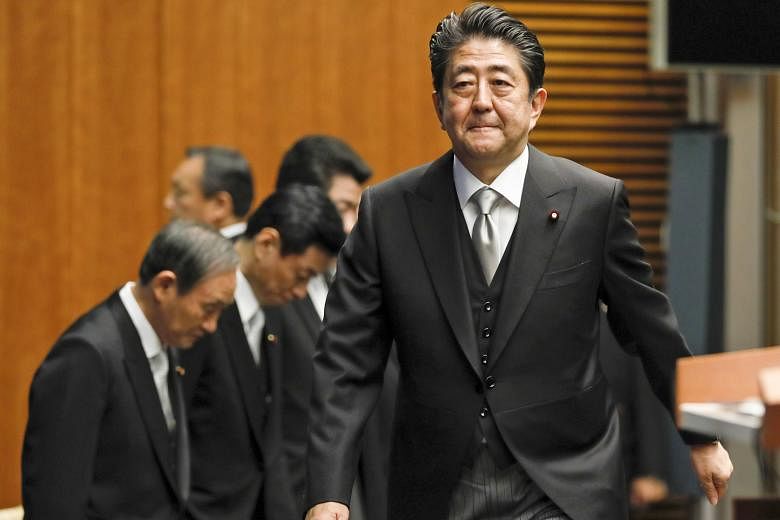Japanese Prime Minister Shinzo Abe named 12 newcomers to his Cabinet yesterday, while favouring stability by keeping his ministers in the key portfolios of finance, foreign affairs, economy and trade.
These positions are filled by his allies, including Chief Cabinet Secretary Yoshihide Suga, Finance Minister Taro Aso, Foreign Minister Taro Kono, Economy, Trade and Industry Minister Hiroshige Seko, and Economic Revitalisation Minister Toshimitsu Motegi.
But the one change that will be closely watched in the region is in the Defence Ministry, with Mr Takeshi Iwaya, a former parliamentary vice-defence minister, replacing Mr Itsunori Onodera as defence chief.
Mr Abe described Mr Iwaya as an expert on security issues, naming him as one of the 12 new ministers who have honed their expertise during their years in politics.
Security expert Tosh Minohara of Kobe University told The Straits Times that Mr Iwaya "is quite knowledgeable and is well regarded as a defence expert in the government".
Though Mr Iwaya remains untested as a minister, Dr Minohara expects him to continue Japan's firm defence stance against North Korea and China, which were labelled as serious threats in the defence white paper this year.
The Cabinet reshuffle, the fourth since Mr Abe took power in December 2012, was also notable for its lack of women.
-
TOP POSTS
-
PRIME MINISTER: Shinzo Abe, 64
DEPUTY PRIME MINISTER AND FINANCE MINISTER: Taro Aso, 78
FOREIGN MINISTER: Taro Kono, 55
DEFENCE MINISTER: Takeshi Iwaya, 61, newly appointed
ECONOMY, TRADE AND INDUSTRY MINISTER: Hiroshige Seko, 55
ECONOMIC REVITALISATION MINISTER: Toshimitsu Motegi, 62
CHIEF CABINET SECRETARY: Yoshihide Suga, 69
REGIONAL REVITALISATION MINISTER: Satsuki Katayama, 59, newly appointed, the only female minister in the new Abe Cabinet
MINISTER IN CHARGE OF 2020 TOKYO OLYMPIC AND PARALYMPIC GAMES: Yoshitaka Sakurada, 68, newly appointed
Despite the Premier's pledge to the United Nations in 2013 to build a "society where all women can shine", only one woman was named to his new team.
Mrs Satsuki Katayama, a former university pageant queen and finance official, was named Minister for Regional Revitalisation and Gender Equality.
There were as many as five female ministers in Mr Abe's Cabinet in 2014.
"Compared with other countries, I have to admit that the proportion of women in the Cabinet is low," Mr Abe said. "But Japan has just started as a society where women can be active, and from now on, I think more women will be able to enter the Cabinet." Even so, he said Mrs Katayama "has a spirit equivalent to that of two or three women, which she can tap to promote the goal of female empowerment".
The Cabinet shake-up came two weeks after Mr Abe was resoundingly re-elected as president of the Liberal Democratic Party (LDP) for a third straight three-year term, paving the way for him to remain in power until September 2021.
The 19-member Cabinet, with an average age of 63.4, has several top policy priorities, including raising the consumption tax from 8 per cent to 10 per cent in October next year. This is to fund social security initiatives in a country where one in five Japanese is now above 70.
Mr Abe wants to revise the pacifist Constitution for the first time since it was enacted in 1947, so as to clarify the status of the military's Self-Defence Force, which is technically stuck in a legal grey zone.
Yesterday, he also unveiled key officeholders in the LDP. Secretary-general Toshihiro Nikai and policy chief Fumio Kishida both kept their positions.
But Mr Abe brought into the top ranks his key allies, including former health minister Katsunobu Kato, who was named chief of the party's decision-making general council.
Mr Akira Amari was made chief of the election strategy committee in a controversial appointment, having stepped down as economic revitalisation minister in January 2016 over a graft scandal.
Next year, the LDP will be facing unified local elections in April and an Upper House vote in July.
Sophia University political scientist Koichi Nakano said: "Abe wanted to keep all his close friends and allies, and at the same time, appoint people who haven't quite had their turn yet. But, generally, they are all pretty conservative and share his ideological right-wing outlook."

